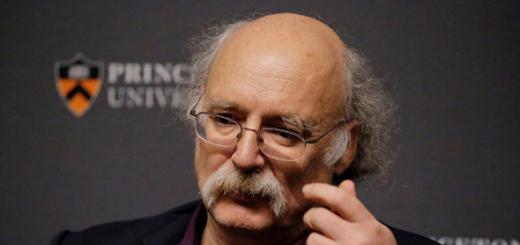Do you want to improve your spoken English? Studying colloquial phrases and expressions - this is exactly where to start!
This article contains everything you need in a conversation on absolutely any topic. You will make your speech richer and more varied, and your communication with people more enjoyable and exciting!
Greetings and farewells
Of course, you can always get by with the words “Hello”, “ How are you?" and “Goodbye”, but there are also more varied ways to say hello and goodbye, especially in a friendly environment (for example, in a group):
| How is it going? | How are things going? |
| How's life? | What's up? |
| How are things? | How is it? |
| Long time no see! | Long time no see! |
| What are you up to? | What are you doing? |
| What have you've been up to? | What have you been doing all this time? |
| See you soon! | See you later! |
| See you later! | See you later! |
| Till next time! | Until next time! |
| Good luck! | Good luck! |
| Take care! | Take care of yourself! |
| Talk to you later! | We'll talk to you later! |
| Until we meet again! | See you! |
| Have a nice day! | Have a good day! |
| Have a good weekend | Good weekend |
| Have a safe trip | Have a good trip |
| Say hi to... | Give my regards to … |
| Send my love to… | Say hello... (if we're talking about about relatives or close people) |
Introductory words
They make sentences more coherent and help the interlocutor follow your train of thought. They also give time to find words without creating long pauses in speech.
| In short / in brief | in short |
| In a word | in a nutshell |
| As far / as to | concerning |
| Not to mention | not to mention |
| First of all/ above all | first of all |
| What's more | Besides |
| By the way | By the way |
| After all | eventually; after all |
| Just for the record | for reference; so that you know |
| And so on and so forth | and so on |
| If I'm not mistaken | if I'm not mistaken |
| In other words | in other words |
| On the contrary | vice versa |
| The thing is | The fact is that |
| So as to / so that | so that |
| Either way | anyway |
| As a rule | usually, as a rule |
| As well as | as well as |
| All the same | doesn't matter |
| On one hand | On the one side |
| On the other hand | on the other side |
| Such as | For example |
| As I said before | as I already said |
| Believe it or not, but | believe it or not, but |
| If I remember rightly / If I recall correctly | If I remember it right |

Ways to express agreement or disagreement
There are many shades between “yes”, “no” and “maybe”. If you want to avoid direct refusal or, on the contrary, express your enthusiasm, these expressions will help you:
| Perhaps | Maybe, maybe |
| Of course / Sure | Certainly |
| Definitely | Definitely, definitely |
| Absolutely | Undoubtedly |
| Naturally | Naturally |
| Probably | Probably |
| You are right | You're right |
| It can hardly be so | This is unlikely to be the case |
| Very well | Very good |
| Most likely | More likely |
| Most unlikely | Hardly |
| Not a bit | Not at all |
| I believe so / suppose so | I guess that's true |
| I doubt it | I doubt |
| No way | No way, no way |
| Exactly so | Exactly |
| Quite so | Quite right |
| I agree with you | I agree with you |
| I am afraid you are wrong | I'm afraid you're wrong |
| I'm afraid so | I'm afraid so |
| I'm not sure | Not sure |
| I don't think so | I don't think so; hardly |
| In a way / to a certain extent | In a sense |
| No doubt | Undoubtedly |
| I'm in / I'm game | I am “for” (in response to a suggestion to go somewhere or do something) |
| I think I'll pass | Better without me |
| Deal! | It's coming! |
| It's a great idea! | Great idea! |
| Not a very good idea | Not a good idea |
| I'm looking forward to it | I'm looking forward to it |

Polite phrases
Always nice in any language. Rest assured, your interlocutor will appreciate knowing these phrases, whether it be a thank you, an apology, or just a simple courtesy.
| I'm so sorry! | I'm really sorry! |
| I beg your pardon! | I'm sorry! |
| I’m sorry, I can’t. | Sorry, I can't. |
| Sorry, I meant well. | Sorry, I wanted the best. |
| It's very kind of you! | It is very kind of you! |
| Thank you anyway! | Anyway, thanks! |
| Thank you in advance! | Thanks in advance! |
| Don't mention it! | Do not mention it! |
| May I help you? | Can I help you? |
| No problem / that’s ok! | Everything is fine! |
| Don't worry about it! | Don't worry about it! |
| This way, please! | Here please! |
| After you! | After you! |

Ways to keep the conversation going and respond to what is said
Undoubtedly, the most popular colloquial reaction is the word “Really?” Depending on the intonation, it can express a variety of emotions, from sarcasm and irony to surprise and sincere delight. But, of course, there are other ways to show interest in what is being said:
| What's the matter? | What's the matter? |
| What's going on? / What's happening? | What's happening? |
| What's the trouble? | What is the problem? |
| What's happened? | What's happened? |
| How was it? | So how? (How did everything go?) |
| Did I get you right? | Did I understand you correctly? |
| Don't take it to heart. | Don't take it to heart. |
| I didn't catch the last word. | I didn't understand the last word. |
| Sorry, I wasn't listening. | Sorry, I listened. |
| It doesn't matter. | It does not matter. |
| It is new to me. | This is news to me. |
| Let us hope for the best. | Let us hope for the best. |
| May I ask you a question? | Can I ask you a question? |
| Next time lucky! | Better luck next time! |
| Oh, that. That explains it. | That's it, that explains everything. |
| Say it again, please. | Could you repeat it, please. |
| So that's where the trouble lies! | So that's the thing! |
| Things happen. | Anything can happen. |
| What do you mean? | What do you have in mind? |
| Where were we? | Where did we leave off? |
| You were saying? | Did you say something? |
| I’m sorry, I didn’t catch you. | Sorry, I didn't hear. |
| Lucky you! | What a score! |
| Good for you! | So much the better for you! (In this phrase, a lot depends on intonation; it often implies sarcasm: “Well, well, I’m glad for you!”) |
| I'm so happy for you! | I'm so happy for you! (But this is said absolutely sincerely) |
| What do you know! | Who would have thought! |

Give great importance speaking skills. The classical methodology, in which translation exercises played a significant role, has become a thing of the past. She was replaced communication technique, which is aimed at the possibility of communication and pays special attention to speaking and listening comprehension. But, nevertheless, classical translation exercises can significantly help in learning English and you should not abandon them completely.
Let's take a closer look at the benefits of such exercises.
Benefits of translation exercises
How to do translation exercises
Examples of exercises for translation from Russian into English
Here's an example simple texts for translation, which you can find in the online English language tutorial website. As part of this article, we provide you with the English and Russian versions of the text (we gave the most literal translation), as well as its audio recording. You can test yourself by doing English-Russian first and then Russian-English translation text and compare them with the original. You can also try to record the translation of the text without relying on the written version, that is, by listening to the recording. The choice is yours.
Curiosity
A little boy looks at his mother at a wedding and says:
“Mom, why is the girl dressed all in white?”
His mother replies:
"She's a bride
and she's wearing white because she's happy
and this is the happiest day of her life.”
The boy nods and then asks:
“Okay, why is the guy wearing all black?”
Listen to the exercise "Curiosity"
Curiosity
A little boy looks at his mum at a wedding and says,
“Mummy, why is the girl dressed all in white?”
His mum replies,
“She is a bride
and she is in white because she is happy
and this is the happiest day of her life.”
The boy nods and then asks,
“OK, and why is the boy dressed all in black?”
Family
My name is Lima.
I am 16 years old.
I'm in 11th grade.
I am American.
There are five of us in the family.
My mother's name is Jane.
She is a housewife.
My dad's name is Thomas.
He is a sales manager.
my younger brother name is Tom.
He is 10 years old.
My younger sister's name is Kerry.
She is only 5 years old.
Listen to the exercise "Family"
Family
My name is Lima.
I am sixteen years old.
I am in the eleventh form.
I'm American.
We are five in the family.
My mother's name is Jane.
She is a housewife.
My father's name is Tomas.
He is a sales promoter.
My younger brother's name is Tom.
He is ten years old.
My younger sister's name is Kerry.
She is only five years old.
London
London - Capital of the UK.
This is one of largest cities peace.
London consists of four parts: the West End, the East End, the City and Westminster.
The City is the oldest part of London, its financial and business center.
Westminster is also an important area of the capital.
This administrative center London.
West of Westminster is the West End, London's wealthiest area.
To the east of Westminster is the East End, the industrial area of the capital.
The Queen's official London residence is Buckingham Palace.
The changing of the guard ceremony takes place every day in its courtyard.
Listen to exercise "London"
London
London is the capital of Great Britain.
It’s one of the largest cities in the world.
There are four parts in London: the West End, the East End, the City and Westminster.
The City is the oldest part of London, its financial and business centre.
Westminster is also an important part of the capital.
It’s the administrative center of London.
To the west of Westminster is West End, the richest part of London.
To the east of Westminster is the East End, an industrial district of the capital.
The official London residence of the Queen is Buckingham Palace.
The daily ceremony of the Changing of the Guard takes place in its courtyard.
Online translation exercise
Conclusion
Let's summarize. Translation exercises from Russian into English are very useful. They perfectly develop thinking and contribute to the development of several skills necessary for successful language acquisition. By translating Russian texts into English, you create an excellent basis for spoken language. Some phrases that you have translated can be remembered as patterns and used in oral speech.
Educational online service Lim English is a great way to learn English. Translation exercises are an integral part of our methodology. In addition, training on our site provides an excellent opportunity to develop perception skills English speech listening, reading and writing.
In order for our words to have meaning, we form them into sentences. Special structure English phrases has its own grammatical and lexical secrets. By correctly combining all the elements, you will be able to speak this foreign language competently.
What is the sentence? This is the structuring of your thoughts, ringed with logical intonation, emotional coloring and grammatical norms. As any reference book says, a sentence is a combination of words that expresses a complete thought and is an independent unit of speech. What classifications exist?
Types of sentences in English according to the purpose of the statement
Comparing with the Russian language, where the meaning does not change by rearranging the places of terms (members), English is more organized. You can read all the details about arranging words into a single phrase in the article about word order in English. Most sentences have a subject (the subject), a predicate (the predicate) and minor members. Each of them performs not only a grammatical function, but also carries a certain lexical meaning.
So, depending on what target pursues your statement, sentences in English can be divided into the following types.
- Narrative , or, as it is often called, an affirmative statement ending with a period. Such phrases report an action, express an attitude, or deny information. They can be either simple or complex (compound or complex). Direct word order is observed here. Example sentences in English - declarative sentences :
The town is asleep. — The city is sleeping.
It’s no use to make a decision today. “You shouldn’t make a decision today.”
I haven't drunk this coffee. — I didn’t drink this coffee.
- Interrogative offers in English language very diverse. Essentially, it is a request for information that can be submitted different types: general, tag question, alternative question, question to the subject, special question. The word order is disrupted by auxiliary verbs, with the help of which questions are formed.
Are you ready? - You are ready?
Do you often walk in the evening? — Do you often walk in the evenings?
He doesn’t speak English, does he? — He doesn't speak English, does he?
Do you like tea or coffee? — Do you like tea or coffee?
Who has the school bag? - Who has a school bag?
What were you doing at 5 ‘clock yesterday? — What were you doing yesterday at 5 o’clock?
- Imperative sentences , as in Russian, call for action.
Stop here! - Stop here!
Let him go! - Let him go!
- Exclamation marks statements in English are called exlamatory .
What a nice day! - What a good day!
How funny it is! - How funny!
If only he came! - If only he had come!
There are several more such expressions that do not belong to any of the listed types:
- Vocatatives: James! Mrs Fox! Girls!
- Yes/No answers (“Yes” - “No” utterance): Yes. No.
- Exclamations (Interjections): Dear me! Goodness gracious! Good heavens!
- Conversational formulas: Thanks. Good-bye. Bye-bye. Hi!
Types of sentences in English by structure
But these units of speech have another classification - according to structure. Each of them can use affirmative and negative sentences, exclamatory and imperative sentences.
1.Simple may consist only of a subject and a predicate (unextented sentence) or, in addition to them, include secondary ones, such as a definition, circumstance, addition (extended sentence). In their composition, these statements have only one pair of main members.
The bravewon't lay down their arms. “The brave ones will not lay down their weapons.
Hewanted to stay for tea with them. “He wanted to stay and have tea with them.”
The car stopped. — The car stopped.
2. The second group can be called statements that are complex in structure, which consist of 2 (in some cases or more) parts - complex sentences. This type also distinguishes its own subgroups: compound (compound sentences) and complex (complex sentences).
- Compound sentences consist of, so to speak, equal parts. In other words, each of them can exist separately and, at the same time, not lose meaning. Unions like and, but, as well as, or connect two elements or are separated by punctuation marks.
The music stopped and the couples on the dance floor began drifting back to their tables.— The music stopped, and the couples from the dance floor began to return to their tables.
Gulliver was lying on his back, his arms and legs were strongly fastened to the ground.— Gulliver lay on his back, his arms and legs were firmly attached to the ground.
- Complex subordinates sentences, on the contrary, consist of a main and dependent clause (the principle and subordinate clause), which, when used separately, loses grammatical and lexical meaning. And here there are also subtypes that are structured according to the type of subordinate clause:
- Subject clauses - subordinate clauses
- Predicative Clauses - predicate clauses
- Object Clauses - subordinate clauses
- Attributive Clauses
- Adverbial Clauses - subordinate circumstances
What I need is a new dress. “All I need is a new dress.”
My impression is that John must not leave now. “It seems to me that John shouldn’t leave now.”
Everyone knows that such people as scientists are few and far between. - Everyone knows that people like scientists do not lie on the road.
I know the girl which is singing now. — I know a girl who is singing now.
After she got married, she changed completely. “After she got married, she changed a lot.
Types of sentences by subject
As in Russian, all English sentences can be divided into 3 types:
1.Personal. If the subject expresses a person, object or concept, then we can call such statements personal.
The child began to cry. — The child began to cry (face).
The plate was broken. — The plate was broken. (item)
The rule is difficult to understand. — This rule is difficult to understand. (concept)
2. Vaguely personal. In such sentences in Russian, the subject is completely absent, and they are translated as follows: “they say”, “need”, “can”. In the English version, the subject is present (you, they, one), but does not carry its semantic load, i.e. does not mean you, they, etc.
One must be careful when crossing the steet. — You need to be careful when you cross the street.
You never know what he may bring next time. — You never know (It’s hard to say) what he might bring next time.
They say that a new theater will soon be built here. — They say that a new theater will be built here soon.
3. Impersonal. Compared with the Russian language, sentences of this type sound like this: Winter. Cold. Dark. It's time to start working. An English sentence must have a subject, another question is what it expresses. Nothing, just like a bunch. And in this situation the pronoun it is used, which is not translated.
It's 6 o'clock. - 6 hours.
It's late. - Late.
It's 3 miles from here. - Three miles from here.
It's winter. - Winter.
It is cold. - Cold.
It happened that nobody had taken the key to the flat. — It turned out that no one took the key to the apartment.
It seems that I have left my textbook at home. — It seems I left the notebook at home.
There is nothing complicated here, it’s worth understanding and remembering once. It is better to study all this in examples that show all the nuances, interactions, and features. Each statement can be simple or complex, affirmative, interrogative or exclamatory. Consider 10 sentences in English.
- I come home at 6 o'clock. - simple, common, affirmative, personal
- Nick and Tom blamed themselves for the accident. - simple, common, affirmative, personal
- How he made a mistake is not clear to us. - complex, subject clause, negative, personal
- This is the house in which I was born. - complex, subordinate attributive, affirmative, personal
- She raised her eyes and she laughed! - complex, compound, exclamatory, personal
- What else could you do? - simple, interrogative, common, personal
- Mr Torrence was staying in the Hotel. - simple, common, affirmative, personal
- The woman cried. - simple, common, affirmative, personal
- He was so ill that he could hardly open his eyes. - complex, subordinate adverbial, affirmative, personal
- Unless somebody interferes, there will not be end for arguing. - complex, adverbial circumstances, personal.
So, I would like to summarize all of the above. Each statement differs not only in meaning, but also in intonation and structure. To determine the type of phrase by purpose, you need to look at the punctuation mark at the end and the presence of the not particle. In a sentence with a simple structure there can be only one pair of subject and predicate; in a complex sentence, on the contrary, there can be two or more. Well, personal or impersonal is very easy to recognize - by the subject, which either performs the action or is simply there for the connective.
In English, as in Russian, there are five categories of sentences, the rules of construction of which must be accurately known in order to successfully communicate in the language.
- Simple sentence - complex sentence
- Declarative sentence - interrogative sentence - exclamatory sentence
Simple sentence in English
Simple sentences are those sentences in which there is only one actor (subject) and one action (predicate). With simple sentences, things are not so simple. You need to know the fixed word order - unfortunately, in English it is strict and it is highly undesirable to deviate from it.
Applies to English offer a basic rule consisting of two points:
1. The subject comes first, the predicate comes second, and then comes everything else.
Schematically, this can be depicted as follows:
Table 1. Word order in an English sentence
|
SUBJECT |
PREDICATE |
REST OF THE PROPOSAL |
|
to work every day. |
||
The following note should be made about this table: You can put a definition BEFORE the subject. And second: this scheme is used for affirmative English sentences, i.e. those with a period at the end.
2. An English sentence ALWAYS has a predicate, i.e. verb!
Even if you don’t hear this verb in the Russian translation of this sentence. For example: There are many wolves in the forest. (there is not a single verb here, although this sentence can be remade for a convenient translation: “There are many wolves in the forest.” This version already has a verb - there are). - There are many wolves in the forest.
Difficult sentence
We call a complex sentence a sentence made up of several simple sentences. As a rule, there are no difficulties with complex sentences, unless it is a complex sentence (that is, a sentence with a subordinate clause).
If you have already graduated from school a long time ago, then the term “ subordinate clauses"most likely won't tell you anything. Therefore, let’s refresh your memory: there are simple sentences (in which there is one predicate/verb), and there are complex sentences (they consist of several simple ones). In turn, complex sentences are divided into compound sentences (in them you can put the conjunction “and” between several simple sentences) and complex sentences (in them from one simple sentence to another you can ask the question “which? why? where? when? under what condition?” how?, etc.”) And subordinate clauses are precisely those simple ones to which we give a question. They are also called dependent in another way. The structure of a complex sentence looks like this:
As can be seen from the diagram, various conjunctions serve as a link between the main and dependent clauses: where, when, which, whose, because, if, etc.
This all seems so distant and incomprehensible, but in fact we use complex sentences much more often than we ourselves notice. So, the following are often used as unions:
Who used in relation to persons (=who):
I'll call George, who is good at computers.
Which refers to inanimate objects, animals, and also to the main clause in general (=which):
Don’t buy the lipstick which we saw yesterday.
She has already finished the report which will allow her a pay rise.
That refers to both animate and inanimate objects (=which):
The man that we met yesterday is my ex.
The car that Tim bought used to be mine.
Table 2. English words connectors of complex sentences
It is important to use correct punctuation (punctuation) in complex sentences.
Structure complex sentences, as a rule, corresponds to two possible schemes.
Main clause + conjunction + Subordinate clause
Subordinate clause + , + Main clause
Alan couldn’t come to the meeting as he was ill.
Things get more complicated if the subordinate clause begins with who, which, or where. Sometimes a comma is needed, sometimes not - it depends on how IMPORTANT this subordinate clause is for the meaning, whether emphasis is placed on it.
Main clause + conjunction + Significant subordinate clause
The driver didn’t remember the place where he had left the car.
The subordinate clause EXPLAINS the word place. Without this subordinate clause, the sentence will lose meaning, so it is meaningful. This means that there is no need for a comma in front of it - it cannot be separated in any way from the main sentence.
Main clause + , + Minor subordinate clause
The driver didn’t remember the parking lot in his neighborhood, where only expensive cars are parked.
The main sentence already contains specification - in his neighborhood. Therefore, the subordinate clause is DESCRIPTIVE, it does not provide important information. This means that it can be separated from the main clause by a comma.
Also, subordinate clauses can interrupt the main thing, “intervene” into it. In this case, we highlight or not highlight with commas on both sides.
The driver didn’t remember the place where he had left the car well.
The driver didn’t remember the parking lot in his neighborhood, where only expensive cars are parked, well.
How to make sentences in English
Declarative sentence
The classification into declarative, interrogative and exclamatory sentences is made based on punctuation marks. At the end of declarative sentences we put a period, at the end of interrogative sentences we put a question mark, at the end of exclamatory sentences we put an exclamation mark. However, they differ not only in punctuation, but also in word order. In declarative sentences, the word order is direct - we talked about them above.
Interrogative sentence
So, there are 2 basic types of questions: general and. To the first we answer “yes” or “no”, and to the second we answer something specific, special (depending on what is asked in the question itself). Remember that the word order in any English sentence is FIXED, and this also applies to questions.
0 place- QUESTION WORD
- What - what? Which?
- Who - who?
- Who(m) - to whom? by whom?
- Where - where? Where?
- When - when?
- Why - why?
- How - how?
- How much (many) - how much?
- Which - which?
- What - which one?
- Whose - whose?
1 place- AUXILIARY
- is/are/am
- do / does / did
- will / would / shall
- have / has
- can/could
- may/might
- ought
- should
2nd place- SUBJECT
3rd place- BASIC (SEMINAL) VERB
4th place- REST OF THE WORDS
There are also several comments to this structure:
NOTE 1. How to choose an auxiliary verb? Very simply: the auxiliary verb is the one that appears first in the original sentence. For example:
- Danny is a worker ---> is
- Anna will drive ---> will
- They have finished the report ---> have
Therefore, to ask a question, you just need to rearrange the subject and predicate.
What to do if there is no auxiliary verb? For example: We visited the museum. Here we only have the main verb - visited. Therefore, when there is no visible auxiliary verb, it is do / does / did, depending on the tense. In our case it is did, since the verb is in .
NOTE 2. The main (semantic) verb, when you ask a question, is pure, that is, without any endings, in the initial form.
NOTE 3. How to understand 0 place? This position in the question is called so because there are question words only in special questions, but not in general ones. It is by the question word that you determine what to answer. For example:
Mother gave her son a tasty medicine yesterday because he was ill.
- Who? -Mother
- Whom? - son
- Whose son? - her
- What? - medicine
- What medicine? - tasty
- When? - yesterday
- Why? - because he was ill
In general questions (those to which you answer “yes” or “no”) question word no, that is, the auxiliary verb comes immediately.
Exclamatory sentence
As a rule, exclamatory sentences begin with what (what the..., which...) or how (how...). Here, too, you need to be careful with the word order.
What..!
Table 3. Word order of English exclamatory sentences
How..!
In exclamations, it is customary to put either an adjective or an adverb after how.
How sweet! - How nice!
How lovely! - How funny!
Sometimes you can find a more detailed construction: How + adjective/adverb + subject + predicate.
How interesting it was to hear her story!
How wonderful it is to see you!
Sentences in English can have a completely different word order than in Russian. At the same time, during translation it is worth adhering to certain rules, for example, if in Russian we see first the main part of the sentence, and then the subject, then in English it may be different. Let's look at different English sentences with translation to clearly see how to translate sentences from one language to another.
- Grandmother has come! => Grandma has arrived!
- Daddy has arrived! => Dad has arrived!
- My friends have come too late => My friends came too late.
- You are having very good time => You are having a great time.
Take a close look at these offers. You will notice that they consist of a different number of words. The first two are not common, the second two are common.
Non-extended ones are those in which only the main (main) members of the sentence are present, namely the predicate and subject. As for the common ones, there are also other (minor) members. They are circumstances, definitions, additions, etc.
Examples of translation of simple sentences (common and uncommon):
- Mother says. => Mom says.
- Children are playing. => Children are playing.
- Grandfather has done. => Grandfather did it.
- Mary is her best friend. => Mary is her best friend.
- The girl is enjoying the sunshine. => The girl enjoys the sunlight (warmth).
- The boy is smiling to her. => The boy smiles at her.
Features of translation when there is no subject
If we talk about simple sentences, then it is important to remember that they are divided into several types. You need to know the categories in order to translate sentences correctly. For example, in personal sentences that denote an expressed person or thing, the subject may be absent, but this does not mean that it does not need to be translated:
- My mother will come in a minute. => My mother will come in a minute (subject present).
- She looks at the window. Stands up. Sits down. Again stands up. She doesn't know what to do. => She looks out the window. Rises. Sits down. He gets up again. She doesn't know what to do.
From the example it is clear that the word she is not present in all sentences, but, nevertheless, it is implied there. There is no need to use the word “she” in every sentence. She gets up. She sits down. She gets up again. It is not right. It is enough to translate she once, and then it is clear from the meaning that the word should be in the sentence.
Features of translation from one and they
When we talk about indefinite-personal sentences, then the subject expresses something indefinite (an object or a person). To convey this (undefined) something in English, we use one And they:
- One can study English only if he wants to. => A person can learn English only if he wants (you cannot force a person to do something).
- One can bake a cake only if he knows how to do it. => A person can bake a cake only if he knows how to do it.
- One can become a policeman only if he is a brave one. => Only those who are brave can become a policeman.
- They say, the summer will be hot. => They say the summer will be hot.
- They say, the meeting will be very interesting. => They say that the meeting will be very interesting.
The examples clearly show that when translating into Russian we omit some words that are present in English. For example, they. Yes, we are writing They say, and not just say, but translate without they: They say, not they say. A similar situation with the word One. In our examples One translated as man and policeman, but the translation is not limited to these words. It all depends on the context.
Features of the translation of impersonal sentences
An interesting situation with translation awaits impersonal sentences. The peculiarity of such proposals is that they do not have actor. How to translate them into Russian? No subject.
Here are some examples:
- It is snowing. => It's snowing.
- It is sunshining. => The sun is shining.
- It is cold. => It's cold.
- It becomes dark very early. => It gets dark very early.
In English impersonal sentences it is used it, which is not translated in Russian. We omit this part of the sentence.
More sentences with translation into Russian:
- It seems that you have seen this man before. => It seems like you've seen this person before.
- It is known that these guys are very talented. => They know these guys are very talented.
- It becomes deeper and deeper step by step. => Step by step it gets deeper and deeper.
Note! English sentences You can't translate word for word. They need to be translated comprehensively. For example, in the last sentence we first translate step by step, and then It becomes deeper and deeper, although in the sentence it’s the other way around. You can, of course, translate It gets deeper step by step, but Step by step it gets deeper sounds better.
Features of translating complex sentences
Such sentences necessarily have coordinating conjunctions. neither .. .nor, as well as, not only … but also, but, etc. Such sentences, consisting of two or three parts, are also separated by commas. This is easier for both perception and translation.
On a note! Simple sentences as part of complex compounds, they must be pronounced with lowering intonation.
- A cold wind was blowing and a snowstorm began. => A cold wind blew and a snowstorm began.
In this sentence the coordinating subject is and, but the sentence is a compound one, not a simple one. The fact is that both sentences (simple ones that are part of a complex one) have a predicate and a subject. If we took, for example, It was cool and windy, then it is clear that this is a simple sentence, because It was also applies to cool, and to windy.
But in the proposal A cold wind was blowing and a snowstorm began we see two separate full-fledged sentences - 1) A cold wind was blowing, and 2) a snowstorm began.
Here are some more examples:
- The metal is made up of irregularly shaped grains, and these tiny grains are the bundling blocks of the metal. => Metal is made up of grains irregular shape, and these smallest grains are the building mass of the metal.
- I wanted to buy a baby Chihuahua, so I started to save my money. => I wanted to buy a Chihuahua puppy, And so I started saving money.
- His dog has won many prizes, but she doesn't know many tricks. => His dog has won many awards, But she doesn't know a lot of tricks.
- I will be glad to help you; I love to cook. => I will be happy to help you; I like to cook.
Note! Complex sentences can be translated without conjunctions. A good example- the last sentence.
In addition to complex sentences, there are also complex sentences, and they, in turn, also have their own subtypes. This is a different topic. We will look at it in our other articles.
Let's sum it up
When we study English sentences with translation from Russian into English, it is better to start training with simple ones, and then take on complex ones. If you learn to correctly translate easy sentences, you will learn to competently cope with complex ones. In the latter case, you will need to learn coordinating conjunctions, which are links between sentences. Do exercises regularly and improve your skills. Good luck!
Views: 397










